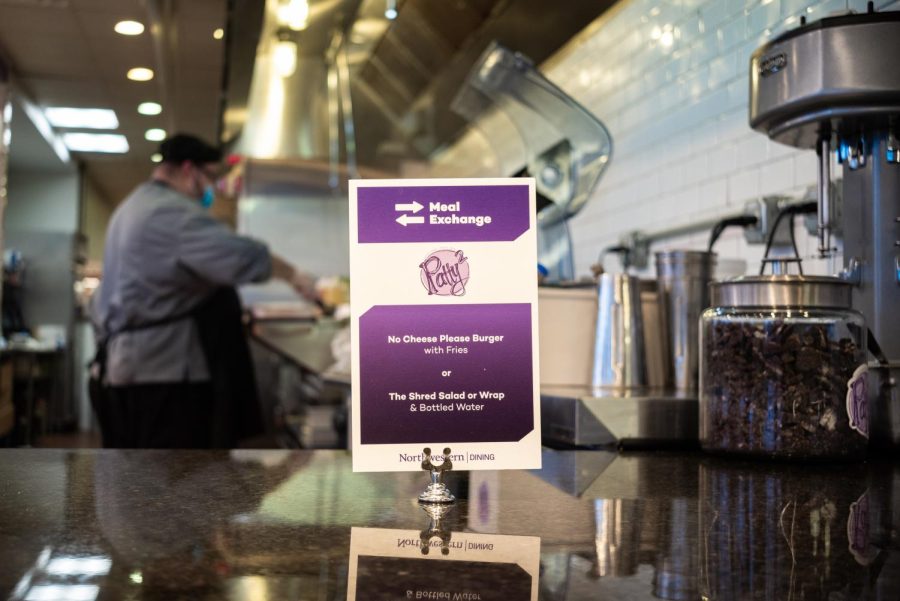Students voice concerns about accessibility of meal exchange options
Ava Mandoli/The Daily Northwestern
Patty Squared in Norris University Center. Some students said they would prefer the Beyond Burger at Patty Squared be offered as a meal exchange to accommodate dietary restrictions.
April 7, 2022
For some students with dietary restrictions, Northwestern dining plan meal exchanges can be inaccessible, especially for those keeping kosher or halal.
All freshmen and sophomores living on campus are required to buy the Open Access meal plan, which costs $2,331 per quarter. This meal plan includes five exchanges per week that allow students to swap one dining hall meal for other options on campus, like chicken tenders at Lisa’s Cafe or a sandwich at Wildcat Deli, served with water and sides of chips or fries.
Students who adhere strictly to kosher laws cannot use meal exchanges, even though they are included in the price of a meal plan. According to kosher laws, meat and dairy products cannot be cooked or prepared together or with the same dishes or utensils. Locations where meal exchanges are offered do not follow this law.
“My main issue with keeping kosher on campus is the lack of equality in terms of the meal exchanges,” Weinberg freshman Brian Parness said. “I feel like it’s not just for us to not be able to use the resource we’re essentially paying for.”
Parness said he would like to be able to replace his meal exchanges with Dining Dollars, which he could spend on kosher snacks at markets on campus, like the Foster-Walker C-Store.
Weinberg freshman Ellie Goldsmith said though she keeps kosher, she is comfortable eating vegetarian options on campus even when they are not prepared in a kosher kitchen.
While Goldsmith said she can eat some meal exchanges, her choices are limited. She said she would like to see Patty Squared include the Beyond Burger as a meal exchange since the regular burger is already a meal exchange option.
Additionally, some students who eat halal food have found it challenging to get halal meal exchanges. In order to be considered halal, food must meet the criteria of Islamic laws, which prohibits pork and specifies how animals must be slaughtered. Most meal exchange locations do not specify whether they follow these rules, such as if they refrain from cooking with alcohol.
Weinberg freshman Taha Charolia said he would prefer a halal food option in Norris University Center.
“I usually just go to MOD for meal exchanges,” Charolia said. “There’s no other options where I could use (a meal exchange) because there’s no halal use.”
Like Goldsmith, Charolia said it would be helpful to Muslim students if more vegan and vegetarian options were available as meal exchanges.
Kosher kitchens are available at Allison and Elder dining halls, along with vegan and halal options and allergy stations, though some students have voiced concerns about the halal offerings.
Parness said the staff at the Allison kosher kitchen are especially accommodating and will save him a to-go plate if he can’t make it during the kosher kitchen’s regular hours.
While Parness is grateful to have kosher options in the dining hall, he said he hopes the University can make meal exchanges more accessible to students who keep kosher.
“It doesn’t come out of a place of anger or being upset with the University,” Parness said. “This is something that is on our minds. We know the campus wants to be accommodating for every single student.”
Email: [email protected]
Twitter: @ilanahutzler
Related Stories:
— NU Dining reinstates MOD salad meal exchange after student advocacy
— Muslim students advocate for transparency in halal food options on campus
— Student Affairs looking to increase kosher, other dietary options with master plan


